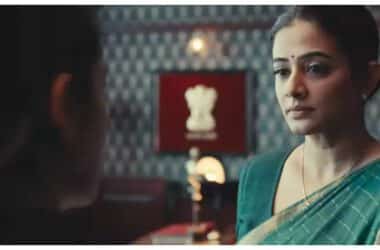[ad_1]
If you watch much Danish television — and that is an option these days, wherever you happen to live — a question rises: How would Denmark function without Sofie Grabol?
In “The Killing” (“Forbrydelsen”), which put Danish TV on the map and made Grabol a star back in 2007, the country’s justice system was held together by her morose detective, Sarah Lund. In her two most recent series, Grabol expands her public-service portfolio. In “The Shift” she plays Ella, the head midwife at Copenhagen’s best public pediatric hospital. And in “Prisoner” she’s Miriam, a reform-minded guard at a prison threatened with closing. Whether she is catching Denmark’s murderers, delivering its babies or minding its inmates, Grabol is indispensable.
To follow Grabol’s progress through the Danish infrastructure, the American viewer will need the streaming service MHz Choice (free trials currently available), which carries “The Shift” (2022) and premiered “Prisoner” (2023) this week. The three seasons of “The Killing” are on the streamer Topic, which will merge with MHz Choice on April 1, consolidating this segment of Grabol’s catalog. (She also plays a public official in the eerie British series “Fortitude,” available on multiple streamers.)
The shows centered on Sarah, Ella and Miriam are quite different — “The Killing” is a lurid crime thriller, “The Shift,” a big-hearted medical soap opera, “Prisoner,” a grim social-problem drama — but the characters have much in common.
Each is aggrieved but indomitable, a working-class Sisyphus pushing ahead through institutional neglect and cowardice — a very squeaky wheel at work — while weighed down by personal trauma. Each is estranged from the only close family member still in her life; two become reluctant surrogate mothers to the women their troubled sons get pregnant. Perhaps Grabol has been typecast over the years, or has typecast herself. Or maybe the grouchy, standoffish, self-righteous pain in the butt is a character that resonates in Denmark.
Grabol is an economical actor, able to communicate a world of emotion through her liquid eyes and seemingly offhand movements. (She’s also blessed with a notably dramatic pair of eyebrows.) She makes all of these bottled-up, difficult women believable and, even when they push everyone away, sympathetic — you can see the layers of pain and weariness that they shelter behind and occasionally break through.
The shows share a sensibility with Grabol’s performances; they are unflashy, meticulously made, superior examples of their genres. (“The Killing” was a trendsetter in transferring the outré violence of 1990s movie murderers into TV, but it presented their offenses with a Nordic reserve.)
“The Shift” is a forthright hospital melodrama, and there’s even an amusing twist on “Grey’s Anatomy” in which Ella is followed around the hospital by her mother, an orderly who breaks into meetings to pester her daughter about her health and love life. The mostly female midwives serve the dramatic function that nurses often do in American stories, putting up with and bailing out the mostly male doctors. The show’s theme is the chronic understaffing of midwives in the public hospital, while its running motif is the staff’s obsession with food, from the critical attention paid to the pastries in the break room to the prescribing of toast and tea for all noncritical medical issues.
But in the hands of its creator and showrunner, the talented director Lone Scherfig (“An Education”), “The Shift” (the Danish title translates as “Day and Night”) has a winning sincerity and humor; it isn’t cloying, and it doesn’t traffic in bad outcomes to gin up emotion. Tricky story lines — a midwife who doubts herself when she’s gaslighted by a struggling doctor, another who sees her patients through the lens of her own history of abuse — are handled delicately. Ella fights for more midwives and finds herself pregnant at 46 (by a married doctor), but she’s chipper and funny, and Grabol gets to show a slightly softer side.
“Prisoner,” created and written by Kim Fupz Aakeson (who, in the small world of Danish TV, wrote two episodes of “The Shift”), takes the critique of the country’s social welfare in a much darker direction. It is structured as a tragedy: Three guards at a failing prison all have fatal vulnerabilities — a secret love life, a junkie son with debts, a friendship with an inmate — that drag them down into a tense and cleverly worked-out spiral of lies and vengeance.
Grabol is primary in the ensemble of “The Shift,” but in “Prisoner” the attention is evenly split among her, Youssef Wayne Hvidtfeldt as the idealistic new guard Sammi and David Dencik as the compromised veteran Henrik. It’s largely Dencik’s show. Henrik, who vacillates between surly anger and puppy dog neediness, is the most interesting character, and Dencik (“Tinker Tailor Soldier Spy,” “Chernobyl”) is terrific.
The beat-downs, drug runs, racial animosities and inevitable spasm of group violence are all familiar, but in its six fairly tight episodes, “Prisoner” makes them credible and achieves a fair measure of the documentary-style grittiness it goes for. Grabol’s Miriam goes down some dark roads — she’s not the justice-obsessed grind of “The Killing” or the dedicated crusader of “The Shift” — but her heart is in the right place. Denmark is still lucky to have her.
Source link










